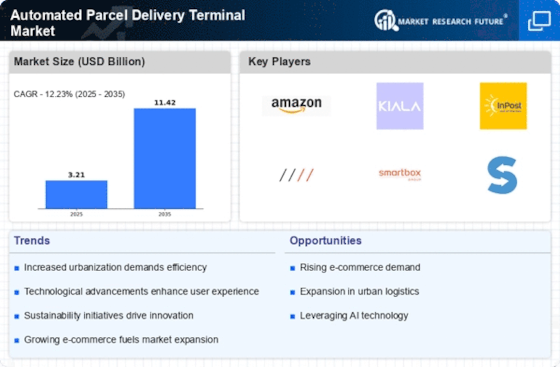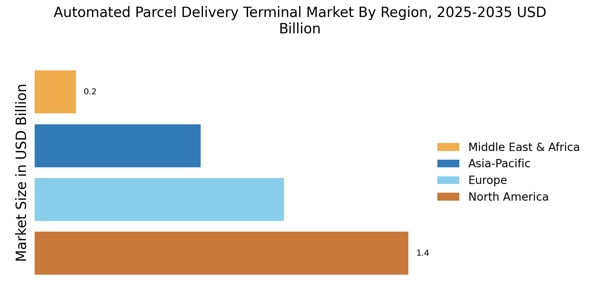E-commerce Growth
The Automated Parcel Delivery Terminal Market is significantly influenced by the rapid growth of e-commerce. As online shopping becomes increasingly prevalent, the demand for efficient delivery solutions rises correspondingly. Recent statistics indicate that e-commerce sales have surged, with projections suggesting a continued upward trajectory. This growth necessitates innovative delivery methods, and automated parcel delivery terminals offer a viable solution. They provide consumers with convenient access to their packages while reducing the burden on traditional delivery systems. Consequently, the Automated Parcel Delivery Terminal Market is poised for expansion, as businesses seek to meet the evolving needs of consumers in a digital marketplace.
Urbanization Trends
Urbanization is a driving force behind the expansion of the Automated Parcel Delivery Terminal Market. As more people migrate to urban areas, the demand for efficient delivery solutions intensifies. Urban environments often face challenges such as traffic congestion and limited delivery windows, making automated terminals an attractive option. These terminals can be strategically placed in high-density areas, allowing for quick and easy access to parcels. Recent studies suggest that urban populations are expected to grow significantly in the coming years, further fueling the need for innovative delivery solutions. The Automated Parcel Delivery Terminal Market is likely to benefit from this trend, as cities seek to modernize their logistics infrastructure.
Sustainability Initiatives
Sustainability is becoming a crucial consideration in the Automated Parcel Delivery Terminal Market. As environmental concerns rise, companies are increasingly seeking eco-friendly delivery solutions. Automated parcel delivery terminals can contribute to sustainability efforts by reducing carbon footprints associated with traditional delivery methods. For example, these terminals can facilitate consolidated deliveries, minimizing the number of trips required for package distribution. Recent data suggests that implementing such solutions can lead to a reduction in emissions by up to 20%. As businesses strive to align with sustainability goals, the Automated Parcel Delivery Terminal Market is likely to see a growing emphasis on environmentally responsible practices.
Technological Advancements
The Automated Parcel Delivery Terminal Market is experiencing a surge in technological advancements that enhance operational efficiency. Innovations such as artificial intelligence, machine learning, and IoT integration are streamlining the parcel delivery process. For instance, AI algorithms optimize delivery routes, reducing transit times and costs. According to recent data, the implementation of these technologies has the potential to increase delivery efficiency by up to 30%. Furthermore, the rise of contactless delivery solutions is reshaping consumer expectations, making automated terminals more appealing. As technology continues to evolve, the Automated Parcel Delivery Terminal Market is likely to witness increased adoption rates, driven by the demand for faster and more reliable delivery services.
Consumer Demand for Convenience
The Automated Parcel Delivery Terminal Market is increasingly shaped by consumer demand for convenience. Modern consumers prioritize speed and accessibility in their shopping experiences, leading to a shift in delivery preferences. Automated parcel delivery terminals cater to this demand by providing 24/7 access to packages, eliminating the need for consumers to wait for home deliveries. Recent surveys indicate that a substantial percentage of consumers prefer using automated terminals over traditional delivery methods due to their flexibility. This shift in consumer behavior is prompting retailers and logistics companies to invest in automated solutions, thereby driving growth in the Automated Parcel Delivery Terminal Market.

















